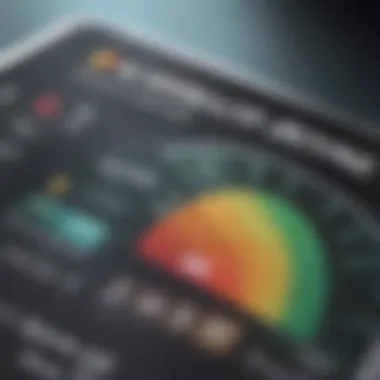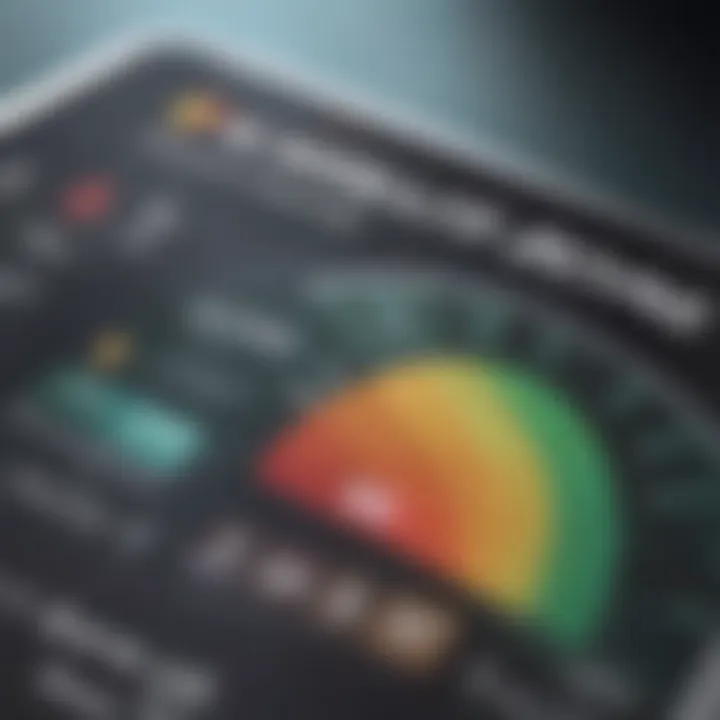Understanding Consolidation Loans for Poor Credit


Intro
Navigating the world of finance can often feel like walking through a minefield, especially when your credit score resembles a speed limit sign in a small town – it’s low and holding you back. For those struggling with poor credit, finding a path toward financial stability can seem daunting. This is where consolidation loans come into play. These loans aim to help individuals with really bad credit consolidate their debts into a single monthly payment, potentially making their financial situation more manageable.
But how do these loans work? What are the benefits and downsides? And, more importantly, are they a solid foundation for improving your credit score? The following sections will pull back the curtain on the mechanics of consolidation loans, providing a clear window into their advantages and disadvantages. The journey will assist you in grasping not just the intricacies but also the broader implications of diving into the world of consolidation loans for people with challenging credit backgrounds.
Investment Dictionary
Key Terminology Breakdown
Understanding the lingo is crucial for anyone dipping their toes into financial waters. When it comes to consolidation loans, here are some terms that often pop up:
- Consolidation Loan: A type of loan that combines multiple debts into a single payment, simplifying the repayment process.
- Credit Score: A numerical representation of a person's creditworthiness based on their credit history.
- Interest Rates: The cost of borrowing expressed as a percentage of the loan amount; it can significantly affect repayment terms.
- Debt-to-Income Ratio: A measure comparing an individual’s monthly debt obligations to their gross monthly income, often used by lenders to assess repayment capability.
Common Loan Types Explained
When looking at consolidation loans, it’s also useful to know about the different types available:
- Personal Loans: Unsecured loans where creditworthiness matters. They can come with higher interest rates, especially for bad credit.
- Home Equity Loans: Secured loans that tap into the equity of your home. These usually have lower interest rates, but the risk of losing your home is significant.
- Credit Card Balance Transfers: This involves transferring debt from high-interest credit cards to one with a lower rate. While it offers temporary relief, it requires discipline to avoid accumulating new debt.
Understanding Consolidation Loans
When it comes to navigating the choppy waters of debt management, understanding consolidation loans becomes crucial for those grappling with really bad credit. With many individuals facing overwhelming financial burdens, knowing how these loans can help one regain financial footing is not just beneficial, but often vital. This section will dive into the definition and purpose of consolidation loans, alongside clarifying how they function.
Definition and Purpose
Consolidation loans serve as a financial lifeline for borrowers who find themselves in a quagmire of multiple debts. Imagine trying to juggle various payments every month—credit cards, personal loans, and maybe a few medical bills thrown into the mix. A consolidation loan rolls these debts into one tidy package, allowing an individual to deal with a single monthly payment, often at a potentially lower interest rate.
The main purpose here is quite straightforward: simplify debt management. Instead of dealing with various creditors and due dates, consolidating allows one to unite the debts under a single lender. This can ease the mental burden and allow more focus on creating a plan for financial recovery. Moreover, when managed responsibly, it can pave the way toward improving one’s credit score over time.
How They Work
Understanding how these loans operate is essential for anyone considering them. So, let’s unravel this a bit.
- Application Process: Initially, an individual will submit an application to a lender. This application often requires information on all existing debts, personal income, and other financial details. The lender will assess the applicant’s creditworthiness based on these inputs.
- Loan Offer: If approved, the lender provides a loan amount sufficient to pay off the existing debts. This can come as a lump sum transferred directly to creditors or deposited into the borrower’s account.
- Repayment: After incoming funds have taken care of other obligations, borrowers start repaying the new loan under the terms agreed upon. This often includes monthly payments that are more manageable. Fixed rates can provide stability, avoiding any unexpected fluctuations in payment amounts.
- Interest Rates: Interest rates on consolidation loans can vary widely, but for those with bad credit, high rates are often the norm. Awareness of this fact is key for borrowers who may feel overwhelmed by a higher cost long term.
In summary, consolidation loans aggregate debt into a single obligation, simplifying repayment and, under the right circumstances, making it more feasible to manage finances moving forward. As the process unfolds, individuals not only tackle their current debts but also work towards a brighter financial future.
Implications of Bad Credit
Understanding the implications of bad credit is fundamental for anyone considering consolidation loans. Bad credit isn't just a number; it carries weight and tangible consequences that can impact various facets of one's financial life. When someone walks around with a low credit score, it often feels like they're dragging a ball and chain that they can't shake off. This section examines what leads to poor credit and the far-reaching effects that can arise from it.
Factors Contributing to Bad Credit
Many elements contribute to a bad credit score. Life’s twists and turns can pile on debts quicker than a snowball rolling downhill. Here are some common factors:
- Missed Payments: Late or missed payments are the most significant red flags. Each instance can knock points off your score, like a game of tug-of-war where the rope keeps slipping.
- High Credit Utilization: If someone is using a large portion of their available credit, it raises eyebrows. Think of it as jogging up a steep hill—once you get too high on the utilization scale, it becomes hard to catch your breath and recover.
- Length of Credit History: Short credit histories may leave lenders wary. It’s like a résumé without enough experience, leaving them unsure about your reliability.
- Bankruptcies and Foreclosures: These denote severe financial distress and can linger on credit reports for years. Picture a giant storm cloud blocking the sun; these records cast shadows over future financial opportunities.
- Inquiries: Hard inquiries occur when lenders check your credit to assess risk. Too many inquiries can lead to concern about a potential borrower’s stability, similar to a worried parent watching a child run off without a safety plan.
Ultimately, each of these factors further entrenches individuals in a cycle of bad credit, making recovery feel like climbing a mountain of quicksand.
Consequences of Poor Credit Scores
Having a poor credit score is akin to trying to swim upstream in a raging river. The consequences are real and can be overwhelming. Below are several key ramifications:
- Higher Interest Rates: When you finally manage to get a loan or credit, prepare for sky-high interest rates. Lenders typically see bad credit as a risk, thus, they offset that risk with costs that can feel like trying to bail water from a sinking ship.
- Loan Denials: Many lenders simply won’t do business with individuals who carry poor credit. It's like showing up to a fancy restaurant in sweatpants; they might not even let you in.
- Insurance Premiums: Bad credit can inflate your insurance costs, as many insurers rely on credit scores. Think of it as throwing fuel onto a fire; an already tight budget can start to burn even hotter.
- Employment Issues: Certain employers check credit reports as part of the hiring process, which can create a barrier to job opportunities. It's an unfortunate circumstance, as you might be perfectly qualified but tarnished by a financial past.
- Difficulty Renting a Home: Landlords often check credit before agreeing to rent. A poor score can knock you out of the running before you even get a chance to meet the landlord.
The weight of bad credit can be heavy. The path to recovery often feels limitless, but it is both necessary and possible to start lifting that burden.
These consequences serve as a constant reminder of the importance of managing credit responsibly. For those with bad credit thinking about consolidation loans, understanding these implications is crucial. Knowledge is power, and being informed allows individuals to navigate their financial landscape wisely.
Eligibility for Consolidation Loans
Understanding the eligibility requirements for consolidation loans is a crucial step for anyone with poor credit thinking about how to tackle debt. After all, without knowing if you're eligible, you might waste time and effort on applications that won't pan out. Generally, lenders look for certain criteria that indicate whether you can repay the loan. This is especially relevant for individuals struggling with bad credit since the stakes are often higher.
General Requirements


To qualify for a consolidation loan, lenders usually check for a few baseline requirements. Here are the most common elements:
- Age: Most lenders require applicants to be at least 18 years old.
- Income Verification: Lenders want to see proof that you have a stable income, whether from a job, benefits, or other sources, to ensure that you can make your loan payments.
- Residency: You must be a resident of the country where you’re applying.
- Bank Account: Having an active checking or savings account is often necessary so lenders can easily manage loan disbursement and repayments.
Once you meet these general criteria, you can move onto more specific qualifications, especially if your credit history isn't in pristine shape.
Specific Criteria for Bad Credit Borrowers
For individuals with really bad credit, the landscape changes considerably. Here are aspects that lenders might focus on:
- Credit Score Threshold: While traditional loans often need a fair to good credit score, lenders focusing on bad credit may accept scores as low as 580. Even so, many consider scores below 600 as red flags.
- Debt-to-Income Ratio: This ratio shows how much of your income goes toward debt payments. Lenders usually prefer a lower ratio, indicating that you have enough income left over to handle additional loan payments.
- Secured vs. Unsecured Loans: Borrowers with poor credit might have an easier time qualifying for secured loans, where you put up collateral (like a car or savings account). Unsecured loans, in contrast, may have stricter guidelines and higher interest rates.
- Previous Loan History: Lenders will often consider your history with other loans. If you have previously defaulted or missed payments, this could negatively impact your chances of approval, while a repayment record may help enhance your credibility.
It's essential to note that different lenders might have various requirements. Getting pre-approved can give you a clearer picture of where you stand.
In summary, understanding the eligibility criteria for consolidation loans tailored specifically for individuals with poor credit opens previously locked doors to potential financial solutions. While the road may be rougher for those with bad credit, knowing what to expect can ease the journey to regaining financial stability.
Types of Consolidation Loans Available
When considering consolidation loans, it’s vital to understand the different types available for individuals grappling with poor credit. This section delves into the significant distinctions and characteristics that can impact your borrowing experience. Knowing what’s out there isn’t just helpful; it’s essential for making informed financial moves. In a world where choices abound, having clarity can either make or break your financial future.
Secured vs. Unsecured Loans
Secured loans require collateral, which can be your home, a car, or any asset of value. This essentially lowers the risk for lenders, making them more likely to approve your loan application despite your less-than-stellar credit. If you’re confident in your ability to make payments, a secured loan might save you money in interest rates compared to an unsecured loan.
However, it’s crucial to remember that if you default on a secured loan, you risk losing your collateral. This can create a daunting scenario where a missed payment could mean losing your car or home.
On the other hand, unsecured loans don't require collateral. While this might sound appealing if you don’t want to part with valuable assets, the catch is that they often come with higher interest rates. These rates reflect a higher risk for lenders since there’s no asset backing the loan.
Here’s a quick comparison:
- Secured Loans
- Unsecured Loans
- Lower interest rates
- Requires collateral
- Risks asset loss if default occurs
- Higher interest rates
- No collateral needed
- Potential for higher monthly payments
Choosing between secured and unsecured loans should be done carefully, taking into consideration your financial situation and ability to repay the debt without endangering important assets.
Fixed Rate vs. Variable Rate Loans
Next up is the debate between fixed rate and variable rate loans. If you’re the type who likes predictability, a fixed-rate loan might be your cup of tea. With a fixed rate, your interest remains constant throughout the loan term, making budgeting more manageable. This is especially useful for individuals on a tight financial leash as it shields you from potential interest hikes.
However, the trade-off here is that fixed rates are often higher than initial variable rates, which can look more attractive on the surface. With variable rate loans, your interest can fluctuate based on the underlying market conditions.
Some pros and cons include:
- Fixed Rate Loans
- Variable Rate Loans
- Stability and predictability
- Easier to budget
- Generally higher initial costs
- Potential for lower initial rates
- Fluctuating interest cost, making payments uncertain
- Risk of increasing costs over time
In a nutshell, whether to opt for a fixed or variable rate loan hinges heavily on your risk tolerance and financial forecasting ability. Each option comes with unique benefits, but understanding the implications of your choice can significantly influence your financial stability in the long run.
"Understanding the types of consolidation loans isn't merely academic; it’s about taking the reins of your financial destiny."
Knowing the nuances tied to secured vs. unsecured loans as well as fixed vs. variable rates equips you with necessary insights to explore all avenues. Making an informed decision can lead you towards a path of financial redemption, irrespective of your credit history.
Evaluating the Pros and Cons
When it comes to making financial decisions, especially regarding consolidation loans, it's crucial to sit down and lay out the positives and negatives. This evaluation can profoundly influence a borrower’s situation. For folks with really bad credit, understanding both sides of this coin can mean the difference between financial relief and deeper trouble.
Benefits of Consolidation Loans
Consolidation loans can be a lifeline for individuals struggling with numerous debts, especially when credit scores are less than stellar. Here are some noteworthy benefits:


- Streamlined Payments: Instead of juggling multiple creditor deadlines, a consolidation loan allows for a single payment. This simplifies budgeting, creating less stress and more clarity in your monthly financial plan.
- Potentially Lower Interest Rates: For some, a consolidation loan might offer a lower interest rate than existing debts. Although the credit score might not be ideal, certain lenders understand the context and provide more favorable terms.
- Improved Credit Score Over Time: By paying off debts through a consolidation loan, you can gradually improve your credit score. The idea is to reduce your credit utilization ratio and establish a positive repayment pattern.
- Flexible Loan Options: Different lenders offer various products, which means it’s possible to find a deal that can work for a borrower’s unique financial landscape. This variety can sometimes yield options that were previously unattainable due to poor credit.
Potential Risks Involved
As tempting as obtaining a consolidation loan can be, it’s equally important to be aware of the pitfalls. Here’s a rundown of risks that ought to be considered:
- Higher Long-term Costs: While a lower interest rate might be enticing, extending the repayment period could lead to paying more in the long run. Borrowers need to weigh the immediate relief against future expenses carefully.
- Fees and Charges: Consolidation loans are not always without costs. Origination fees, late payment fees, or even Hidden Charges can rear their ugly heads. It’s crucial to read the fine print of any loan agreement thoroughly.
- Potential for Increased Debt: If a person gets a consolidation loan but continues their previous spending habits, they may find themselves in a deeper hole. The loan can act as a temporary fix rather than a solution.
- Impact on Credit Score: In some scenarios, applying for a consolidation loan can lead to hard inquiries, which may temporarily ding your credit score. It’s wise to consider the timing of applications.
The key takeaway? Weigh the advantages with caution and keep your eyes peeled for traps that could turn relief into new worries.
The Application Process
When it comes to consolidation loans, having a firm grasp on the application process is vital. This is particularly true for individuals with bad credit, as the stakes can be high. An effective application can significantly smooth out hurdles that might come your way during your financial journey. Understanding how to navigate through the application process could mean the difference between securing a lifeline or facing another financial setback.
Gathering Necessary Documentation
Before you get down to filling out forms, it is essential to gather all necessary documentation. This step is not just about ticking boxes; it illustrates diligence and preparedness to potential lenders. Here’s a run-down of what you’ll likely need:
- Proof of Identity: Typically, this includes a government-issued ID such as a passport or driver’s license.
- Income Verification: Pay stubs, tax returns, or bank statements that confirm your income. Lenders want to see that you have a steady income to repay the loan.
- Credit Report: While lenders will check your credit report, having your own copy can help you understand where you stand and address any inaccuracies beforehand.
- Debt Documentation: List of what you owe, including credit cards, loans, and any other debts. This gives lenders a full picture of your current financial situation.
- Personal Information: Contact details, social security number, and other identification details might be required to complete your application.
Gathering these documents can seem like a chore, but remember: being organized makes a good impression. It also puts you in the driver's seat from the get-go.
Completing and Submitting Your Application
After you’ve rounded up all the required paperwork, it’s time to fill out the application. This can often feel a bit daunting, especially when bad credit is on the table. However, tackling it step by step can simplify the process.
- Carefully Fill Out Forms: Pay attention to every detail. Ensure your information aligns with the documents you’ve gathered. Discrepancies could raise red flags.
- Be Honest About Your Credit History: If your credit score is poor, it’s generally best to be upfront. Some lenders appreciate honesty and may offer insights or options you wouldn’t find otherwise.
- Double-Check Everything: Mistakes happen; make sure to review your application for any errors that could delay processing.
- Submit Your Application: Depending on the lender, you might complete this step online or through a physical application. Don’t forget to keep a copy of everything you send in for your records.
Being thorough in completing your application not only increases your chances of approval but also helps in building a transparent relationship with the lender.
Understanding Loan Terms and Conditions
In the world of finance, comprehending loan terms and conditions is like reading the fine print on a contract — it is critical. For individuals seeking consolidation loans while grappling with bad credit, understanding these terms can make the difference between a sound financial decision and a regrettable debt trap. This article segment sheds light on the significance of loan terms, particularly interest rates, fees, and repayment schedules, which impact the overall expense and management of the loan.
Interest Rates and Fees
Interest rates are key to understanding how much you will ultimately pay back on the loan. When lenders assess an application from someone with bad credit, they typically adjust the interest rate to account for perceived risk. This can lead to much higher rates than what one might expect from a borrower with a solid credit history. Therefore, it’s vital to scrutinize how the lender calculates these interest rates.
- Fixed vs. Variable Rates: A fixed interest rate maintains the same percentage throughout the life of the loan, providing predictability in repayment. Conversely, a variable rate can fluctuate, which might mean lower initial costs but can also lead to higher future payments. It’s often recommended to leaning towards fixed rates if your credit is shaky.
- Fees: Hidden fees can sneak up on borrowers. Origination fees, late fees, and prepayment penalties can significantly increase the total amount owed. Make sure to ask the lender about these fees upfront. For instance, an origination fee could eat into your initial loan amount, affecting how much you effectively receive to pay off existing debts.
Key Considerations:
- Always inquire about the APR (Annual Percentage Rate), as it reflects the total cost of borrowing over a year, including fees.
- Clarify the difference between the interest rate and the APR to avoid surprises later on.
"Knowing your interest rates and associated fees doesn’t just save dollars; it saves a heap of stress in the long run."
Repayment Schedules
The repayment schedule outlines how and when repayments will take place. Understanding the repayment terms is crucial, as it not only dictates the loan duration but also the monthly payment amounts and the overall plan of action for regaining financial stability.
- Monthly Payments: This is the sum you will pay every month towards your loan. Monthly payments can vary based on the total amount borrowed, interest rates, and length of the loan. For individuals in tough financial spots, obsessively calculating and reassessing these figures can help in choosing a suitable repayment plan.
- Loan Duration: The length of time you have to repay the loan often affects your monthly payments. Longer terms typically result in lower payments but higher total interest costs. Alternatively, shorter terms might strain monthly budgets but reduce the amount of interest paid overall.
- Missed Payments: Failing to make repayments on time can incur hefty penalties and lead to further damage to an already poor credit score. It is critical to understand both the consequences of late fees and the potential for defaulting on the loan, which can push you deeper into financial distress.
Key Strategies:
- Assess your budget before choosing a repayment schedule to ensure you can consistently meet the monthly requirements.
- Always confirm if the lender offers flexibility in repayment options, which can be a lifesaver if your financial situation changes.
Improving Your Credit Score Post-Loan
Understanding the importance of improving your credit score after taking out a consolidation loan cannot be understated. Many people view these loans as a means to an end, focusing solely on the immediate relief they provide from numerous debts. However, the key to truly escaping the clutches of bad credit lies in your ability to rebuild your score once you've consolidated. It's a process that requires diligence and some know-how, but the long-term benefits can be significant and transformative.
Not only does a better credit score open the door to more favorable loan terms in the future, but it also impacts your chances of securing rental agreements, getting insurance at a lower rate, or even landing that job you've had your eye on. In a way, repairing your credit is akin to planting a garden. At first, it may feel like a daunting task, but with proper care and consistency, you’ll soon see seeds sprout into tangible benefits.
Strategies for Credit Repair
To embark on the journey of credit repair post-loan, several actionable strategies can pave your way:


- Pay bills on time: Establishing a history of timely payments is pivotal. Even one missed payment can ding your score.
- Limit new credit inquiries: Too many credit applications in a short time can make you appear desperate and in need. It's best to limit these.
- Maintain low credit utilization: Ideally, keeping your credit utilization below 30% of your total available credit is advisable. High utilization can signal financial strain.
- Review your credit report: Regularly check for inaccuracies in your credit file. Errors can weigh down your score, so challenge any discrepancies you see.
- Set up automatic payments: For the forgetful, this can prevent missed payments from derailing your progress and keeps your budget on track.
Implementing these strategies isn’t a magic bullet, but over time, they can be the little nudges that add up to considerable improvement.
Monitoring Your Credit Progress
Keeping an eye on your credit progress is vital once you’ve enacted your repair strategies. Monitoring isn't just about seeing your score rise or fall; it’s about understanding the underlying reasons behind these changes. Here are several ways to effectively track your credit journey:
- Utilize free credit monitoring services: Many services, such as Credit Karma or Experian, offer free access to your score and credit report updates. This helps you understand how your actions impact your score.
- Track your bills and payments: A budget app can simplify this process, showing you both income and expenditures, ensuring all payments are made on time, which is vital for positive progress.
- Assess your credit reports regularly: Consider taking advantage of your right to a free annual credit report from major bureaus. This allows you to review your accounts and contest any inaccuracies.
- Set goals: Whether it’s to improve your score by a specific number or reduce credit utilization, having tangible targets can keep you motivated.
With these methods in place, you’ll not only witness your score improve but also have a much clearer picture of how your financial habits shape your credit health.
"Rebuilding your credit is not just about fixing numbers; it's about regaining control over your financial future.”
Alternatives to Consolidation Loans
When grappling with bad credit, consolidation loans might not always be the best or only avenue to explore. This section highlights alternatives that could potentially ease one's financial burden without the pitfalls associated with consolidation loans. Exploring these options provides crucial insights and strategies that could cater to various personal financial situations.
Debt Management Plans
Debt Management Plans, or DMPs, can be a lifesaver for individuals facing overwhelming debt, especially when traditional methods seem inaccessible. A DMP entails working with a credit counseling agency to create a customized plan that allows you to pay off your debts over a structured timeline. You might hear people say, "A little teamwork goes a long way," and that rings especially true here. The agency acts as a mediator between you and your creditors, managing the payment process.
With a DMP, you typically make a single monthly payment to the counseling agency, which then disburses the funds to your creditors. This simplifies your financial life significantly. Rather than juggling multiple due dates, you consolidate your payments into one. The agency may also negotiate lower interest rates and fees on your behalf, making your debts more manageable over time.
Key points to consider in a DMP:
- Structured Payments: You don’t have to worry about missed payments since everything is managed by the agency.
- Negotiated Terms: Creditors might be more willing to negotiate because they see you’re actively working to pay off your debts.
- Moral Support: It's not just about numbers. Having someone to discuss your financial woes with can be quite comforting.
However, it’s important to weigh the downsides. DMPs might require monthly fees for the service, and not all creditors agree to participate. Furthermore, by the time you reach your goal, the road may feel long, requiring patience and discipline.
Credit Counseling Services
Credit Counseling Services offer a gateway to financial education and responsible budgeting. These agencies specialize in assisting individuals with bad credit to rebuild their financial standing. They provide information, tools, and resources tailored to help you manage your debts effectively, setting you on a path toward financial literacy.
The process usually begins with a comprehensive assessment of your financial situation through a counseling session. You discuss your income, debts, and expenses openly, which can feel daunting but ultimately paves the way for a strategic plan moving forward. The advisors can help identify the core issues impacting your credit, and they can offer sound advice on how to address them.
Benefits of utilizing credit counseling services include:
- Personalized Guidance: The tailored advice helps in understanding individual financial situations more clearly.
- Budgeting Assistance: You’ll learn more about where your money goes each month, helping you to cut unnecessary expenses.
- Responsible Decisions: You’ll be better equipped to make informed choices about loans, credit cards, and other financial commitments.
While these services might come with a fee, they often result in long-term savings by improving your financial habits. Just remember, the key is commitment; it's about turning over a new leaf and actively engaging with your financial future.
"The best time to plant a tree was twenty years ago. The second best time is now." Understanding that now is the time to seek help will contribute immensely to your recovery.
Common Misconceptions
When discussing consolidation loans for individuals grappling with poor credit, it's crucial to clear the air about common misconceptions. These fallacies can easily mislead someone seeking financial relief, potentially steering them off course. Understanding the realities behind these misconceptions not only informs better decision-making but also helps in navigating the often murky waters of credit and loans.
Assumptions About Eligibility
One of the biggest misconceptions is that being eligible for a consolidation loan is out of reach if your credit score is low. Many beleive that lenders won't even consider their application. This notion holds little water. While it is true that bad credit can limit options, it doesn’t shut the door completely. Some lenders specifically cater to individuals with poor credit histories. There may be stricter terms and higher interest rates, but solutions do exist.
Lenders often assess the whole picture, like income, debt-to-income ratio, and other financial behaviors. Consider this: Think of yourself trying to fit into a suit that’s a size too small. Just because it’s tight doesn’t mean it’s not for you. You may have to adjust and look for alternatives that fit you better.
Here are a few insights about eligibility:
- Understanding Lender Criteria: Not all lenders have the same eligibility requirements. Taking the time to research can reveal options you didn’t think possible.
- Your Financial Picture: Be prepared to present a broader picture of your finances. Evidence of stable income can significantly influence lenders’ decisions.
- Dedicated Lenders: Many financial institutions actually specialize in loans for bad credit. Sometimes it's just a matter of finding the right match.
Understanding Loan Offerings
Another common misconception revolves around the nature of consolidation loans themselves. There’s a belief that all consolidation loans are created equal, but that’s far from the truth. Not understanding the various offerings can lead borrowers into unfavorable situations.
Consolidation loans can vary widely—some may be secured while others are unsecured. Secured loans, backed by collateral (like your home or car), generally come with lower interest rates, but the risk of losing that asset is real. Unsecured loans, while less risky in terms of asset loss, often carry much higher interest rates—even for those with bad credit.
Furthermore, terms of the loans also differ:
- Interest Rates and Fees: Some loans may have hidden fees, so it’s imperative to read between the lines of any agreement. Look for origination fees or pre-payment penalties that could affect your total repayable amount.
- Loan Duration: The length of the loan can also impact the overall cost. Shorter terms typically come with higher payments but less interest paid over the life of the loan.
To emphasize this point:
"Not all paths are paved. Some roads lead to dead ends, and some might surprise you with their conditions."
In closing, understanding these common misconceptions is essential. Knowledge empowers you to make informed choices, ensuring that when you take a leap into consolidation loans, it’s not into the deep end without a life vest.







